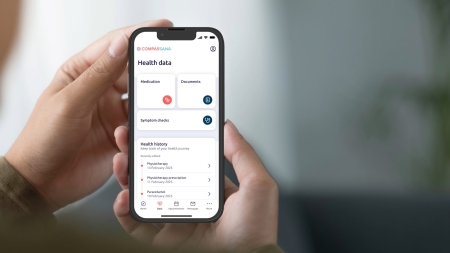How to manage a herniated disc without resorting to surgery
Even if it sounds counterintuitive, exercise is good for you if you have a herniated disc. Read on to find out about other things that can help.

A herniated disc can severely affect your day-to-day life. Even the smallest movements can be excruciating, and sitting or standing for long periods can prove to be a real strain. Added to this is often uncertainty surrounding which method of treatment is the right one.
Specialised therapy for a swift recovery
In the majority of cases, a herniated disc resolves itself without the need for surgery. A combination of pain management, physiotherapy and specific muscle-building exercises can help to alleviate symptoms and prevent the problem from recurring.
What helps precisely?
- Gentle exercise: going for walks or doing gentle exercises help the healing process.
- Physiotherapy: targeted exercises strengthen the back muscles and ease pressure on the spine.
- Maintaining the correct posture in day-to-day activities: an ergonomic sitting position and lifting techniques that protect the back are crucial.
- Massages: a variety of massage techniques are employed to relax the muscles and relieve tension.
- Applying heat and cold: these include, among other things, thermal compresses, heat packs, a warm bath, a sauna or infrared light therapy. Heat can help relieve muscle tension. By contrast, cold packs such as cold compresses or gel packs can be used to relieve nerve inflammation.
- Ultrasound therapy: this method involves applying sound waves to the lower back. The gentle vibrations generate heat, which relaxes the tissue.
Medication is often used to relieve back pain or sciatica (sciatic neuralgia) caused by a herniated disc. These primarily consist of painkillers, as well as muscle relaxants and anti-inflammatories. The following over-the-counter low-dose medications are most commonly used:
- Non-steroidal anti-inflammatory drugs (NSAIDs): this group includes, among others, diclofenac, ibuprofen and naproxen. They relieve pain and reduce inflammation. Given that NSAIDs can affect blood clotting, they may cause minor forms of bleeding, such as nosebleeds or bleeding gums, or in some cases more serious bleeding, for example in the gastrointestinal tract. In addition, they have been known to cause stomach ulcers in some individuals and to impair kidney function. Patients with asthma, cardiovascular diseases or gastric ulcers should consult a doctor before taking these medicines.
- Paracetamol: this analgesic is an option for individuals who are unable to take NSAIDs, for example, because of stomach problems or asthma. However, taking high dosages of paracetamol can lead to liver and kidney damage. Adults should not exceed a maximum daily intake of 4 grams (4000 milligrams) – this is equivalent, for example, to eight tablets each containing 500 milligrams of paracetamol. It is also important to ensure a minimum interval between doses.
Prescription-only medications include:
- Opioids: these potent painkillers may only be used under medical supervision. They vary in strength – morphine, for example, is a particularly strong analgesic, while tramadol is less potent. Some opioids are also available as patches. Possible side effects include nausea, vomiting, constipation, dizziness, breathing problems and fluctuating blood pressure. Long-term use may be habit-forming and lead to physical dependence.
- Corticosteroids (“cortisone”): these anti-inflammatory and pain-relieving drugs can be administered in the form of tablets, intravenous fluids or injections into the muscle. The active ingredients are dispersed throughout the body (“systemic” effect). Long-term use, however, can increase the risk of developing gastric ulcers, osteoporosis, infections, skin problems, glaucoma and glucose metabolism disorders.
- Muscle relaxants: these are a type of sedative that also relax the muscles. As with other types of psychiatric medication, they may cause drowsiness and dizziness, and therefore impair the individual’s ability to drive and operate machinery. They may also affect the liver and cause gastrointestinal problems.
- Antiepileptic drugs: originally formulated as a treatment for epilepsy, a number of these drugs have also been approved for the treatment of nerve pain (neuralgia). They are an option if a nerve that has been irritated by a herniated disc is the cause of persistent pain. Possible side effects include drowsiness and fatigue, which can impair the individual’s ability to drive and operate machinery.


